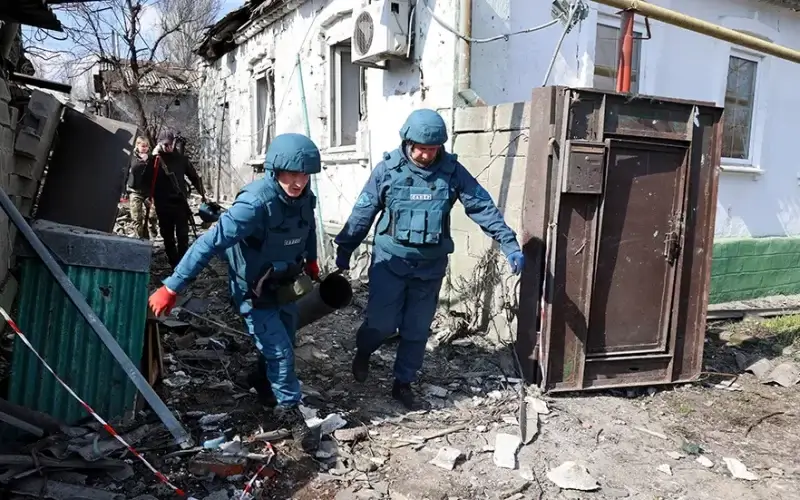Western nations along with Ukraine are bracing for more brutality following Russia’s reported appointment of a new general meant to oversee the Kremlin’s attack on the former Soviet country.
Officials warn that Gen. Aleksandr Dvornikov, 60, who previously commanded Russia’s southern military district, also led crushing military operations in Ukraine’s Donbas region and in Syria, which resulted in the massacres of tens of thousands of civilians — a brutal past that U.S. officials say may show its face in Ukraine in the coming weeks.
The newly installed general comes as the Kremlin, now 46 days into its invasion, appears to have switched focus to the eastern part of Ukraine following failed attempts to topple the government in Kyiv.
“He and other senior Russian leaders … have shown clearly in the past their disregard for avoiding civilian harm, their utter disregard in many ways for the laws of war, laws of armed conflict, and the brutality with which they conduct their operations,” Pentagon press secretary John Kirby said of Dvornikov on Monday.
“I think, sadly, we can all expect that the same brutal tactics, that same disregard for civilian life and civilian infrastructure, will probably continue as they now focus in a more geographically confined area in the Donbas.”
Known as the “Butcher of Syria,” Dvornikov was the first head of Russia’s military operations in the country after Russian President Vladimir Putin ordered troops there in September 2015 to back Syrian President Bashar Assad.
In Syria, Dvornikov was part of a military campaign that bombed and razed densely populated neighborhoods in Aleppo, the country’s largest city, in which chemical weapons were used and banned cluster munitions were dropped by both the Russian and Syrian militaries.
Since 2016, Dvornikov has been the commander of Russia’s southern military district, responsible for the fighting in Donbas prior to the invasion of Ukraine that began on Feb. 24.
Mason Clark, the lead Russian expert at the Institute for the Study of War, acknowledged that while he was involved in brutal operations in Syria, the notion that Dvornikov was the “architect” of those campaigns is an exaggeration.
“He’ll certainly put that experience to good use,” Clark said. “But he’s not necessarily the sort of unique figure that is the only one that has done these operations.”
Still, Dvornikov’s reputation has top U.S. officials worried that the war will take a particularly violent turn and become far worse than what’s already been seen.
“What we should all be aware of … is this is a general who was already responsible for overseeing atrocities in Syria, and we would expect that it would be a continuation of the type of atrocities we’ve already seen take place in Ukraine,” White House press secretary Jen Psaki told reporters Monday.
At the Pentagon, Kirby said Dvornikov could usher in “a more protracted and a very bloody next phase here of this conflict.”
“I don’t know and wouldn’t pretend to say that we know for certain that this new general is going to be the author of some new additional and more bloody tactics, but we can certainly say by what we’ve seen in the past … we’re probably turning another page in the same book of Russian brutality,” Kirby added.
National security adviser Jake Sullivan on Sunday warned that Ukraine should expect “scorched-earth warfare” from Russia, adding that it’s consistent with the way the Kremlin has been fighting from the beginning.
“We’ve seen atrocities and war crimes and mass killings and horrifying and shocking images from towns like Bucha and rocket attacks on Kramatorsk. So, I think this is an indication that we will see more of that,” Sullivan said on CBS’s “Face the Nation.”
John Herbst, former U.S. Ambassador to Ukraine who is now the senior director of The Atlantic Council’s Eurasia Center, noted that Dvornikov’s appointment does not signal a new tactic of targeting civilians, which the Russians have already done over the course of the invasion. Rather, it appears to be a change-up following a disastrous start to the attack that initially appeared to have no unified plan of action or a commanding general.
“Clearly, their offensive in Ukraine — the first offensive with this invasion has failed. And now they’re starting a second round, and they want a general with a record of success,” Herbst said.
“Whether or not he’s going to do something new and smart, we’ll see. But clearly, whoever’s in charge of the first round, didn’t do too well. And it’s normal for political leaders to replace failed military commanders,” he continued.
Dvornikov takes on his new role as Russia is preparing for what’s expected to be an all out assault on Donbas, Ukraine’s industrial heartland and the easternmost part of the country.
Though the military offensive in Donbas has not yet begun, Kirby said the Russians are working to reinforce and resupply its troops in the region, with a convoy of vehicles seen to be heading south toward the town of Izyum — just north of and on the edge of Donbas.
Ahead of that fight, Dvornikov must take on the arduous task of centralizing Russia’s forces, which have thus far been plagued by morale and logistics issues, according to experts and defense officials.
Having only been commander over one district, he now has to integrate units from the central and western military districts. Many of these units have struggled with missing officers, missing vehicles, low morale and resupply problems.
“We certainly don’t think he’s superhuman,” Clark said. “The southern military district units have done the best out of Russian forces in this invasion. But that’s, frankly, a quite low bar, and they’ve still been met with difficulty and haven’t been able to push through to date in eastern Ukraine.”
Retired Brig. Gen. Kevin Ryan, former U.S. defense attaché to Russia who is now a senior fellow at the Belfer Center at Harvard University, said that Dvornikov is still facing the limited number of troops Moscow is working with.
“He is a better commander, he will do a good job for the Russians. He will motivate the troops and solve problems that they’ve had. And he will be violent and cause damage in Ukraine,” Ryan said. “But, he will be working under the same restrictions and the same lack of resources that whoever was before was working with.”
Psaki also pointed out that even with the change in leadership, it doesn’t erase Russia’s stumble in the first part of its invasion and continued struggles to show any clear wins on the battlefield.
“It has not gone as President Putin has planned and we don’t expect a change in personnel will change that,” she said.










